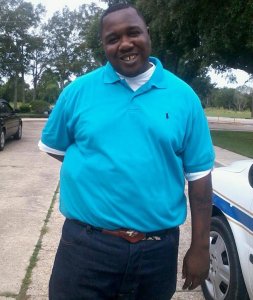It took Baton Rouge police Officer Blane Salamoni less than 90 seconds to shoot Alton Sterling, but police took nearly two years to fire the officer and release footage from his body camera.
Salamoni’s firing Friday was the latest chapter in a tumultuous week for Sterling’s family. State officials decided not to file criminal charges against the two officers involved in the fatal 2016 shooting, saying their actions were justified. Days later, police said Salamoni violated use of force policies.

A second officer, Howie Lake II, was suspended for three days without pay for losing his temper during the incident.
And for the first time since the shooting, members of Sterling’s family were able to watch several graphic videos of the deadly confrontation.
“Today was a troubling day, it was a sad day, but it was a day for truth,” L. Chris Stewart, an attorney for the family, told reporters. “Truth that we don’t really see too often.”
Videos show deadly encounter
As Baton Rouge police Chief Murphy Paul announced the disciplinary actions against the officers Friday, the department released new videos showing the incident that unfolded as police responded to a 911 call of a man with a gun at a convenience store.
Surveillance video from the Triple S Convenience store shows Sterling selling DVDs outside and packing up his goods as Lake arrives and confronts him.
When Salamoni arrives to help Lake, he pulls his gun seconds later, according to his body camera video. Ten seconds into the video, as Sterling questions why the officers are trying to detain him, Salamoni shouts, “Don’t f—– move or I’ll shoot your f—- a–. Put your f—— hands on the car.”
Video from Lake’s body camera shows the officer approaching Sterling, trying to get him to put his hands on the hood of a car, and eventually struggling with him on the ground. During the altercation, another person, presumably Salamoni, screams, “He’s got a gun!” and soon thereafter gunshots are heard.
When the officers get up, Sterling is lying on the ground outside the front door of the convenience store with a blood-soaked red shirt.
A gun is not visible in the video, but Lake tells another officer he put it in his car. The officers had been responding to a call from a homeless man who said Sterling showed him a weapon after he approached Sterling for money.
Police have said a .38-caliber handgun was found at the scene.
Less than 90 seconds passed from the moment when Lake first approached Sterling to the firing of the final shot, according to a Department of Justice report of the July 5, 2016, shooting.
The four videos released Friday include the convenience store surveillance video as well as two police-worn body camera videos and a video recorded by the dashboard camera in one of the police cars.
Two bystander videos released not long after the 2016 shooting had captured the final part of Sterling’s struggle with the two white officers.
Family attorney says Sterling was not violent
Stewart said the videos show that Salamoni came at Sterling like “a pit bull and immediately escalated the entire situation.”
Sterling didn’t threaten or put a hand on the officers, Stewart said. He just kept asking Salamoni and Lake what he had done.
“It’s a tough job; they have to deal with a lot, but (with) high duty comes high expectations,” Stewart said. “You’re not just a warrior but a guardian. You don’t just look after white people, you look after black people and Hispanics and Asians and everyone else.”
Michael Adams, another attorney for the Sterling family, said the videos released Friday show a different depiction of the man.
“Today you saw that Alton Sterling was not some wild, deranged, cocaine-filled, high, big black man who was out of control. The person who was out of control was Blane Salamoni,” Adams said.
Louisiana Attorney General Jeff Landry said earlier this week that Sterling had illicit drugs in his system, which may have contributed to “his noncompliance.”
An autopsy report by the East Baton Rouge Parish Coroner’s Office indicated Sterling had cocaine, methamphetamine, hydrocodone, a marijuana ingredient, caffeine, nicotine and alcohol in his blood.
The family’s attorneys said Sterling was not violent.
“Never once pushed an officer, touched an officer, kicked an officer, did anything,” Stewart said. “But yet he ended up dead.”
‘Fear cannot be a driver’ for officers
An internal police investigation into Sterling’s actions determined the officers’ actions “were not minor deviations from policy,” Paul said Friday.
“Our police officers are held to a higher standard,” the chief said. “Fear cannot be a driver for an officer’s response to every incident. Unreasonable fear in an officer is dangerous.”
Salamoni’s firing and Lake’s suspension are the first serious consequences for the officers since the shooting.
They had been accused of violating Sterling’s rights under the Fourth Amendment, but federal prosecutors in May found there wasn’t enough evidence to warrant civil rights charges against them.
The two officers had separate closed-door disciplinary hearings Thursday. Salamoni chose not to answer any questions, and Lake answered every question, Paul said.
Salamoni will appeal, according to his attorney, John McLindon.
“Blane understands that he’s not going to be a Baton Rouge police officer again,” McLindon said. “He wants to more or less clear his name and have a higher authority say what he did was consistent with your training and the law.”



















